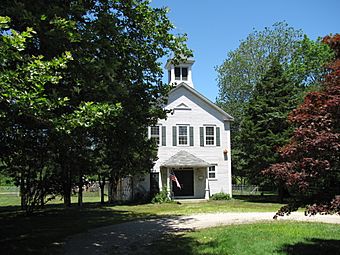Russells Mills Village Historic District facts for kids
Quick facts for kids |
|
|
Russells Mills Village Historic District
|
|

Russells Mills Library
|
|
| Location | Dartmouth, Massachusetts |
|---|---|
| Area | 74 acres (30 ha) |
| Architect | Multiple |
| Architectural style | Greek Revival, Late Victorian, Federal |
| NRHP reference No. | 85002011 |
| Added to NRHP | September 5, 1985 |
The Russells Mills Village Historic District is a special area in Dartmouth, Massachusetts. It's like a preserved piece of history, showing what a busy industrial center looked like long ago. This area was very important from the 1700s to the early 1800s. It was officially added to the National Register of Historic Places in 1985, recognizing its historical value.
Contents
What is Russells Mills Village?
Russells Mills Village is located about 4.5 miles (7.2 km) south of US Route 6. It sits on the west side of the Paskamanset River. The village spreads out along Russells Mills and Horseneck Roads. Other smaller roads also connect to its center.
Buildings and Features
This historic village has about 40 buildings. Most of these are wooden houses. They were built in the 1700s and early 1800s. One house is thought to be from 1670. This makes it the oldest building still standing in Dartmouth!
You can also find the town's old animal pound here. It's a stone area built in 1831. It was used to hold stray animals. Other important buildings include Davolls General Store, which was a store from the Federal period. There's also a former church built in 1830 and two old school buildings.
A Look Back in Time: History of the Village
Even though Dartmouth was settled in the 1650s, the Russells Mills area started later. The Russell family arrived in the 1670s. They settled near where Destruction Brook meets the Paskamanset River.
Early Industry and Growth
The river was soon dammed, creating a strong water flow. The Russell family used this power to build mills. These mills helped grind grain into flour and saw lumber. More mills were built, using the water power from both the river and Destruction Brook.
In the mid-1700s, a small shipyard also opened here. The village grew and became very successful. This lasted until the 1850s. By then, bigger mills in places like Padanaram and New Bedford became more important.
Architectural Styles
Because the village was most successful before the mid-1800s, many buildings show older styles. You can see Georgian, Federal, and Greek Revival architecture. These styles were popular when the village was at its busiest. They tell the story of a thriving community from long ago.



